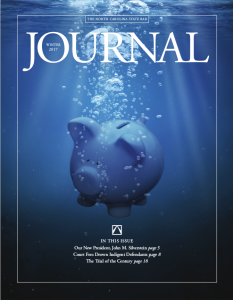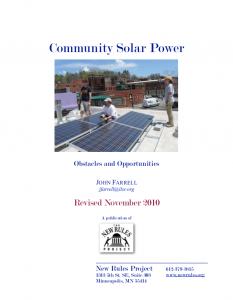The Trial of the Century: Kids, Climate and the Law’s Role in Allocating Responsibility for Harm
 AIRE’s interest in community-owned renewable energy is grounded in the idea of rights and justice in the most basic sense. That is, we ought to have the right to choose clean, green, renewable energy, and further we ought to have the right to choose how and by whom it’s generated. Similarly, and on a more universal scale, rights and justice certainly apply to a habitable climate. Shouldn’t we all have a right now and in the future? Shouldn’t it be a matter of justice if that right is taken from us? Many, including the youth of the world, think so. The rights and justice framing also helps connects the dots between a deadly energy system we’re trying to replace and the consequences of it that are increasingly ever present, not “out there in the future.”
AIRE’s interest in community-owned renewable energy is grounded in the idea of rights and justice in the most basic sense. That is, we ought to have the right to choose clean, green, renewable energy, and further we ought to have the right to choose how and by whom it’s generated. Similarly, and on a more universal scale, rights and justice certainly apply to a habitable climate. Shouldn’t we all have a right now and in the future? Shouldn’t it be a matter of justice if that right is taken from us? Many, including the youth of the world, think so. The rights and justice framing also helps connects the dots between a deadly energy system we’re trying to replace and the consequences of it that are increasingly ever present, not “out there in the future.”
Steve Owen, AIRE co-founder, and Audrey Koncsol, a 3rd year law student at Wake Forest University, wrote this article for the North Carolina Bar Journal (PDF) in December of 2017. The referenced lawsuit is moving forward in federal court and the latest developments in the suit can be found at OurChildrensTrust.org. This article is particularly relevant given the amount of climate-related news (wildfires, hurricanes, heat waves, etc. although rarely reported as such) and the storms swirling around the U.S. Supreme Court.
Community Solar: Obstacles and Opportunities

John Farrell, whom we consider to be one of the leading thinkers on community solar, wrote this 2010 report, which we think is worth reposting for benchmarking and reflection. Participation and ownership were the key things we wanted to experiment with in our project described in the report. This was at a time (wow, 8 years ago!) when precious little was really understood about how to actually do tax equity finance for community projects, while at the same time there was plenty of hype about tax credits and the good times to come. David Brosious at University Park Solar (another of the author’s case studies) was a smart thought partner and generous fellow traveler.
“When I read this report and see John Farrell’s “report card” for community solar projects, just like when I read so many others, my first reaction is that we (AIRE and the rest of us) really haven’t made any progress relative to the urgency. Sometimes the truth hurts, and in this case it’s also dangerous in terms of the need for a rapid transition to zero-carbon energy. But we keep trying!”
Steve Owen, Executive Director – AIRE
.